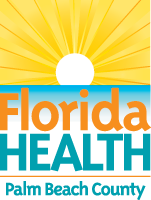It's a New Day in Public Health.
The Florida Department of Health works to protect, promote, and improve the health of all people in Florida through integrated state, county, and community efforts.
Summer Heating Up--Beat the Heat--Avoid Heat Exhaustion
July 26, 2017
Palm Beach County, FL-- As the heat index sours above 100 degrees the Florida Department of Health in Palm Beach County urges people to take steps to prevent heat-related illnesses such as heat stress, exhaustion and stroke. Statewide more than 3,000 people are seen in emergency rooms each year for heat-related illnesses.
“Floridians enjoy great weather all year. As we enjoy the summer months, we want to remind everyone to use precaution when in the sun or exposed to high heat,” said Dr. Alina Alonso, Director, Department of Health in Palm Beach County. “Heat exhaustion can develop after exposure to high temperatures and not drinking enough water. Those who are most vulnerable to heat exhaustion are the elderly, infants and small children, individuals with medical conditions such as high blood pressure and individuals working or exercising in a hot environment.”
Warning signs of heat exhaustion vary, but may include:
- Heavy sweating
- Paleness
- Muscle cramps
- Tiredness
- Weakness
- Dizziness
- Headache
- Nausea or vomiting
- Fainting
- Moist and cool skin
- Fast and weak pulse
- Fast and shallow breathing
If heat exhaustion is suspected, cooling measures that may be effective include:
- Drinking cool, non-alcoholic beverages as directed by a physician
- Resting in an air-conditioned environment
- Taking a cool shower, bath or sponge bath
If left untreated, heat exhaustion may progress to heat stroke, which occurs when the body becomes unable to control its temperature. Immediately seek medical attention if any of these symptoms are present:
- Hot, dry skin or profuse sweating
- Throbbing headache
- Confusion/dizziness
- Hallucinations
- Chills
- High body temperature
- Slurred speech
TIPS FOR PREVENTING HEAT-RELATED ILLNESSES
- Drink plenty of fluids that do not contain alcohol or large amounts of sugar. Limit sodas because of the added sugar and caffeine. Sweat is 99 percent water, so when you exercise or play, you lose water. Don’t wait until you are thirsty to drink fluids and always make sure your water is clean. Add slices of fruit to water or drink 100 percent juice if you do not like the taste of water.
- Limit outside activity to morning and evening hours. Be cautious and stay out of the sun when exercising between 10:00 a.m. and 4:00 p.m. Children, seniors and persons with health problems should stay in the coolest available place, not necessarily indoors.
- Rest often in shady areas, or remain inside in an air conditioned space.
- Dress for summer by wearing lightweight, light-colored and loose fitting clothing to reflect heat and sun. Wear wide-brimmed hats to shade the sun.
- Protect your eyes and skin by wearing sunglasses and sunscreen. Use sunscreens with SPF 15 or higher that protect against both UVA and UVB rays. Sunburn reduces your body's ability to dissipate heat. Sunscreen should be applied every 2 to 4 hours, liberally enough to all sun-exposed areas that it forms a film when initially applied.
- Do not leave children or pets in an unattended vehicle because the temperature can reach 135 degrees in less than ten minutes.
For more information visit: www.flhealthpalmbeach.org, or Center for Disease Control (CDC) for extreme heat facts: https://www.cdc.gov/Features/ExtremeHeat/. The National Oceanic Atmospheric Administration’s for heat index information: www.noaa.gov.





Connect with DOH